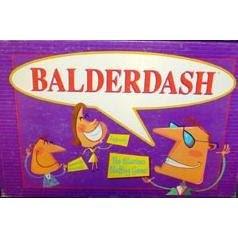 Apples to Apples Board Game :
Apples to Apples Board Game :The concept of Apples to Apples is pretty easy: match the adjective card on the table with a noun or verb card from your hand.
But that’s only the tip of the iceberg.
Watch hilarity ensue as players match terms like "Fluffy" to "Mildew" or "Sticky" to "Horror film." While it may be limited by the hand of cards you’re dealt (what if you don’t have a perfect match for "Harry Truman"?), there is some strategy to the game. Each round of card matching is judged by a different player at the table. So you can use it to your advantage to play a card that you know is a shoo-in for certain judges.
Use the red cards in your hand to make hilarious matches to the green card on the table. When someone wins a round, they place that Green Apple card in front of them on the table. This, effectively, is the point tracking system and eliminates the need for pen and paper. Since the person who has gathered the most Green Apples is the winner at the end of the game, it behooves players to lobby for their cards. Again, hilarity ensues.
The fact that everyone is judge at some point makes this game all-inclusive. The fast pace and lack of accessories make it portable. The combinations thrown together in Mad Lib style make it addictive. This Party Box version comes with more than 700 Red Apples and 252 Green Apples to keep game play interesting for quite a while. But if you’re playing with a more adventurous crowd, check out these variations on Wikipedia.
The Party Box edisiton of Apples to Apples includes 756 Red Apple cards, 252 Green Apple cards, and two deluxe card trays.

Balderdash :
Balderdash™, the classic bluffing game, has gone beyond hilarious. With real but outrageous content that now includes a new category, Laughable Laws. The categories contain real but unbelievable content about People, Words, Initials, Movies and Laws. Players make up phony answers to these categories, read them off along with the correct answer, and then vote on which answer is real. Score points for guessing correctly and for bluffing the other players. So grab the bull by the horns and play Balderdash, the game that's hilarious beyond belief. ®2004 Gameworks Creations Inc
You just ran into a zugzwang!
Was it...
1. an old school chum.
2. A small swivel cannon fired from the back of a camel.
3. A bad move in a game of chess.
4. A Tasmanian tree toad.
It's defintely one of these--but which one? That's what you have to discover in Balderdash, the game of phony defintions and masterful bluffing, with hundreds of the zaniest, most unbelievable words in the English language.
 Create a Story:
Create a Story:Create-A-Story is the first board game to make story writing kid's play. Travel through time, walk on the moon, befriend a talking frog. Your story can take many twists and turns depending on the cards you draw and how you piece it together. The fun comes in watching creative sparks fly!
This high-adventure game is designed to help students:
 Structure a story
Structure a storyDevelop characters and plots
Use dialogue
Set up conflict and resolution
Write with confidence and imagination
Experience the joy of writing
The rewards are great
Everyone learns (and laughs!) just by playing.
Offers multiple levels of play.
Develops lifelong creative writing and thinking skills.
Suitable for a wide range of students including those with learning differences or a gift for writing.
Ideal for individual or group play, for ages 5-99.
Success is built into the game so everyone is a "winner."





No comments:
Post a Comment